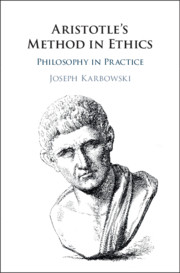
- Cited by 5
-
Cited byCrossref Citations
This Book has been cited by the following publications. This list is generated based on data provided by Crossref.
2019. Books Received. The Classical Review, Vol. 69, Issue. 2, p. 679.
Rossi, Gabriela 2021. A Method of Resolutions: Rereading NE 7.1, 1145b2–7. Phronesis, Vol. 67, Issue. 1, p. 27.
Butsykina, Yevheniia 2022. Discourse on the philosophical and ethical method of Aristotle. Karbowski, J. (2019). Aristotle’s Method in Ethics: Philosophy in Practice. Cambridge, UK; New York: Cambridge University Press.. Sententiae, Vol. 41, Issue. 1, p. 76.
Inamura, Kazutaka 2023. THE ELEATIC STRANGER'S METHOD IN ARISTOTLE'S ETHICS. The Cambridge Classical Journal, Vol. 69, Issue. , p. 22.
Hämäläinen, Tomi 2023. Aristotle on Truth, Dialogue, Justice and Decision. Vol. 144, Issue. , p. 117.
- Publisher:
- Cambridge University Press
- Online publication date:
- December 2018
- Print publication year:
- 2019
- Online ISBN:
- 9781108303644




